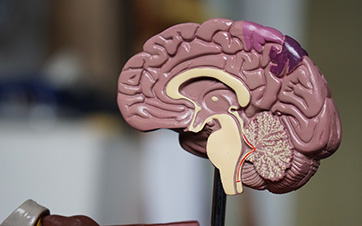
This brain cancer awareness post will explain the most studied brain cancer risks. We will also explain some signs to watch out for if you are in an at-risk group.
Brain Cancer Risks
A cancerous brain tumor can be primary or secondary. A primary brain tumor arises from brain tissue, while secondary brain tumors come from another location in the body.
So, one of the risk factors for brain cancer is being diagnosed with another type of cancer. Breast, colon, kidney, lung, and melanoma skin cancer are common types that may potentially spread to the brain.
Primary brain tumors are far less common than those that spread from other areas of the body. Understanding the following risk factors for primary brain tumors is essential for further lowering these rates.
Age
Brain tumors are more common in people at opposing ends of the age spectrum. In other words, children and older adults have an increased risk. However, that is not to say that people of other ages can't develop one.
Gender
Most types of brain cancer are more common in people assigned male at birth than female at birth. One exception is meningioma, a typically benign brain tumor that forms on the layer of tissue surrounding the brain.
Weight
People who are overweight have a slightly higher risk of developing brain tumors. The risk is higher for certain types of tumors, including meningioma tumors that develop on the protective tissues around the brain.
Family History
A small percentage of brain tumors have a hereditary link, meaning someone's risk is higher if a family member has a brain tumor diagnosis. Experts believe that the following genes may be shared by these individuals:
- NF1 and NF2 genes
- The APC gene, which is also linked to Turcot syndrome
- The PTCH gene, which is also linked to Gorlin syndrome
- TSC1 and TSC2 genes
- The TP53 gene, which is also linked to Li-Fraumeni syndrome
As noted, the percentage of brain tumors with a genetic component is very low. Only 5% to 10% of people with a brain tumor diagnosis have a family history of brain tumors.
Exposure
Exposure to certain environmental and household chemicals, toxins, and other potentially carcinogenic (i.e., cancer-causing) substances can increase the risk of brain tumors. Carcinogens associated with brain cancer include:
- Radiotherapy
- Electromagnetic fields
- Infections
- Viruses
- Allergens
- N-nitroso compounds
Not all of these substances are guaranteed risk factors for brain cancer. We need more research to understand the significance of the link and how considerable the risk is in humans.
Ethnic Background
Ethnicity and race can impact someone's risk of brain tumors. For example, people of European descent have a higher risk of brain cancer than ethnically Japanese people.
In the US, studies have also shown a correlation between race and certain types of brain tumors. Specifically, white people are more likely to develop gliomas and less likely to develop meningiomas compared to Black Americans.
Head Trauma
Brain injuries may increase someone's risk of developing certain types of tumors. Studies have found a link between head trauma and meningiomas. Others have found that there is no connection between gliomas and injuries.
Seizures
People with a history of seizures or a seizure disorder may be at a higher risk of brain tumors. However, some experts also believe that brain tumors cause seizures, making it challenging to understand which condition comes first.
The Signs of a Brain Tumor
We have discussed the various types of brain tumors and their symptoms elsewhere on our blog. Check out the link for a full list of general and tumor-specific signs of brain cancer.
In this post, we want to talk about more specific symptoms of tumors based on their locations in the brain. We will also discuss headaches, which occur in about 50% of people with brain tumors.
Headaches: The Most Common Brain Tumor Symptom
A brain tumor can cause a headache if it grows large enough to put pressure on the healthy brain tissues surrounding it. Tumors can also put pressure on healthy brain cells due to inflammation and swelling.
Brain tumor headaches come in many forms and can happen anytime, though some people report their symptoms as worse earlier in the day. The pain may increase with pressure from coughing or other forceful movements.
Some people experience worse pain in the area where the tumor is located. For example, a tumor on the brainstem may cause headaches that spread to the back of the neck.
Tumor Symptoms by Brain Area
Signs of a brain tumor can be categorized based on their location. Since each area of the brain controls a specific bodily function, tumors growing in those regions can interrupt these activities.
To help you identify possible signs of a tumor, here is a list of the major brain areas and their functions:
- The Frontal Lobe: Controls executive functions, such as movement, behavior, decision-making, personality, mood, and more
- The Parietal Lobe: Controls sensations, logic, reading, and writing
- The Occipital Lobe: Controls vision
- The Temporal Lobe: Conrtols verbal language, memory, hearing, and emotions
- The Cerebellum: Controls balance and coordination
- The Brain Stem: Controls vitals, such as breathing, heartbeat, and blood pressure
- The Pituitary Gland: Controls hormone secretions
Symptoms affecting these areas of the brain may also indicate another medical condition. That is why seeing a doctor about any unusual symptoms related to the brain is crucial for catching cancer and other disorders early on.
Brain Cancer Awareness With CT Brain Tumor Alliance
Risk factors for brain tumors include young or old age, being assigned male at birth, and having a family history of brain cancer. People with a higher risk of brain tumors should be on the lookout for common symptoms like headaches.
Brain cancer awareness is crucial for catching signs and symptoms early and reducing complications and fatalities. CT Brain Tumor Alliance's mission is to help you do just that.
Browse our resources for more information on brain cancer-causing tumors, or donate to the cause to support our mission.
Disclaimer
All content and information on this website is for informational and educational purposes only and nothing herein shall be construed as medical advice. Always consult your medical provider for your particular needs and circumstances prior to making any medical decisions.

